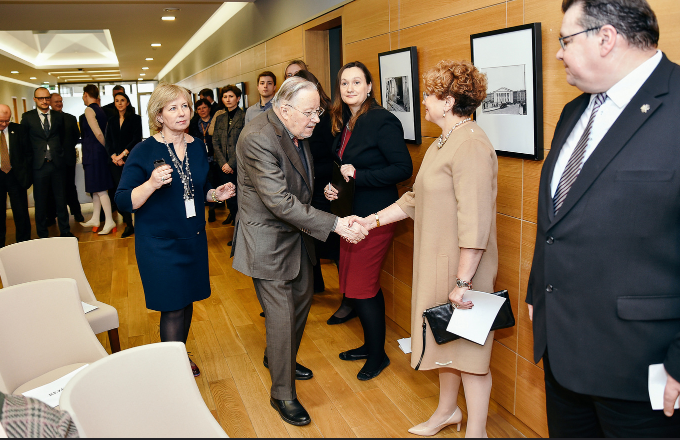
Honorable foreign minister,
Dear Holocaust survivors,
Dear rescuer friends,
Members of the Jewish Community,
Honored ambassadors,
This day is dedicated to remembering, thinking and looking towards the future.
We have gathered here to honor the victims of the Holocaust. Today we mourn together.
Let us honor the victims of the Holocaust with a minute of silence.
…
We mourn our countrymen, our friends, patriots, and in the case of members of my community, every time we experience the loss again of our family members.
We appreciate that the Lithuanian Foreign Ministry, in other words, the Lithuanian state, initiated this shared honoring of the victims.
It is an honor to me that today among us there are members of the community who survived the Holocaust. Your life is a gift to us, and your testimony is the best lesson for any audience. In line with Jewish tradition, I wish you a long life, may you live to 120.
Not long ago I heard one rabbi saying suffering makes a Jew a real Jew, that without suffering a Jew is not a Jew. I personally do not believe that suffering is an essential part of being Jewish. Let’s live without it. I don’t want my children and grandchildren to suffer as my parents did.
It is sad that we begin to celebrate the hundredth anniversary of the state of Lithuania with a Holocaust commemoration. Let’s hope that what was done to the Jews in Lithuania, the genocide carried out, will never again happen.
Recently I heard a wise person say that history always goes forward, but anti-Semitism keeps coming back.
Minister, ladies and gentlemen:
This event is worthwhile, because here we can speak and testify to everyone, and all the more so since the Government of Lithuania adopted a resolution to approve the definition of anti-Semitism adopted in Bucharest by the International Holocaust Remembrance Alliance. The proposal has been made to all state institutions to keep this definition in mind in their work.
The IHRA recommendation on a legal, working definition of anti-Semitism states: “Anti-Semitism is a certain conception of Jews which may express itself in hatred towards Jews. Oral and physical expressions of anti-Semitism are directed against Jews or non-Jews and their property, Jewish communal institutions and religious sites.”
I would also like to quote Lithuanian prime minister Saulius Skvernelis: “The entire democratic world must always fight ever new expressions of anti-Semitism, to put a stop to even the slightest opportunity for this negative expression to arise. Therefore the application of a united and broad definition of anti-Semitism should contribute to efforts by the international community to increase the fight against anti-Semitism.”
In the 21st century there should be no place for anti-Semitism. It shouldn’t have a place in articles or speeches, nor in social media or internet comments. Our commitment to pursue this goal is the best way to honor the victims of the Holocaust whom we will never allow to be forgotten.
In September of this year we will mark the 75th anniversary of the liquidation of the Vilnius ghetto.
Today I can proudly say our Jewish community has published a unique book: the diary of Vilnius ghetto prisoner Yitzhak Rudashevski. This is the diary of a child, an unbelievable testimony through the eyes of a child, and it is very sad. This book, which we will launch at the Vilnius Book Fair, will endure as an important proof of the events of the Holocaust to future generations.

